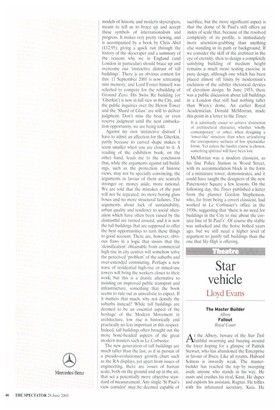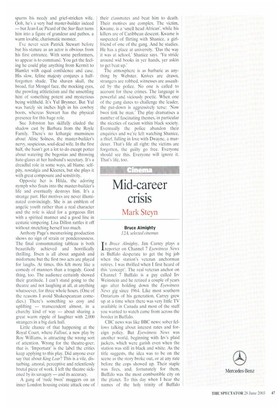Star vehicle
Lloyd Evans
The Master Builder Albety Fallout Royal Court
Atf the Albery, beware of the Star Trek aithful swarming and buzzing around the foyer hoping for a glimpse of Patrick Stewart, who has abandoned the Enterprise in favour of Ibsen, Like all tyrants, Halyard Solness is inwardly weak. The masterbuilder has reached the top by sweeping aside anyone who stands in his way. He ousts and crushes his rival, Knut. He dupes and exploits his assistant, Ragnar. He trifles with his infatuated secretary, Kaia. He
spurns his needy and grief-stricken wife. Ooh, he's a very bad master-builder indeed — but Jean-Luc Picard of the Star fleet turns him into a figure of grandeur and pathos, a warm lovable, charismatic monster.
I've never seen Patrick Stewart before but his stature as an actor is obvious from his first entrance. With some performers, to appear is to command. You get the feeling he could play anything from Kermit to Hamlet with equal confidence and ease.
His slow, feline majesty conjures a halfforgotten shade. The shaven skulk, the broad, flat Mongol face, the mocking eyes, the prowling athleticism and the unsettling hint of something potent and mysterious being withheld. It's Yul Brynner. But Yul was barely six inches high in his cowboy boots, whereas Stewart has the physical presence for this huge role.
Sue Johnston has skilfully eluded the shadow cast by Barbara from the Royle Family. There's no lethargic mumsiness about Aline Solness, the master-builder's nervy, suspicious, soul-dead wife. In the first half, she hasn't got a lot to do except potter about watering the begonias and throwing hate-glares at her husband's secretary. It's a dreadful role in some ways, all blame, selfpity, nostalgia and Kleenex, but she plays it with great composure and sensitivity.
Opposite her is Hilda, the adoring nymph who floats into the master-builder's life and eventually destroys him. It's a strange part. Her motives are never illuminated convincingly. She is an emblem of angelic youth rather than a real character and the role is ideal for a gorgeous flirt with a spirited manner and a good line in ecstatic simpering. Lisa Dillon rattles it off without stretching herself too much.
Anthony Page's mesmerising production shows no sign of strain or ponderousness.
The final consummating tableau is both beautifully achieved and horrifically thrilling. Ibsen is all about anguish and misfortune but the first two acts are played for laughs. At times, this felt more like a comedy of manners than a tragedy. Good thing, too. The audience certainly showed their gratitude. I can't stand going to the theatre and not laughing at all, at anything whatsoever, for three whole hours. (One of the reasons I avoid Shakespearean comedies.) There's something so cosy and uplifting — transcendent almost, in a churchy kind of way — about sharing a great warm ripple of laughter with 2,000 strangers in a big dark hall.
Little chance of that happening at the Royal Court, where Fallout, a new play by Roy Williams, is attracting the wrong sort of attention. Wrong for the theatre-goer, that is. 'Important' is the label the critics keep applying to this play. Did anyone ever say that about King Lear? This is a vile, disturbing, amoral, perceptive and relentlessly brutal piece of work. I left the theatre sickened by its savagery — and its accuracy.
A gang of 'rude bwoi' muggers on an inner London housing estate attack one of their classmates and beat him to death. Their motives are complex. The victim, Kwame. is a 'smell head African', while his killers are of Caribbean descent. Kwame is suspected of flirting with Shanice, a girlfriend of one of the gang. And he studies. He has a place at university. 'Das the way it was at school,' Shanice says. 'Yu stride around wid books in yer hands, yer askin to get beat up.'
The atmosphere is as barbaric as anything by Webster, Knives are drawn, strangers are robbed, witnesses are assaulted by the police. No one is called to account for these crimes. The language is powerful and viciously poetic. When one of the gang dares to challenge the leader, the put-down is aggressively terse: 'Now bwoi tink he man.' The play dramatises a number of fascinating themes, in particular the niceties of racism within black society. Eventually the police abandon their enquiries and we're left watching Shanice, a thief, falling in love with Dwayne, a murderer. That's life all right: the victims are forgotten, the guilty go free. Everyone should see this. Everyone will ignore it. That's life, too.



































































 Previous page
Previous page